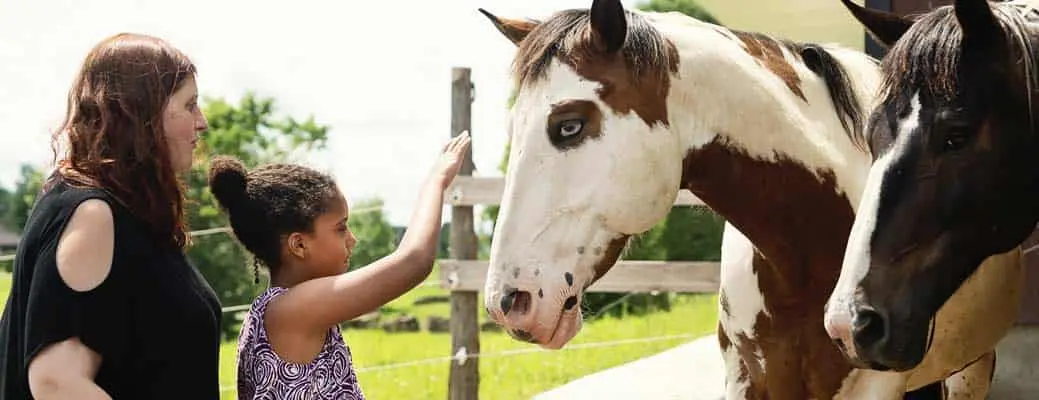Is Starting an Agritourism Business Right for Your Farm?


Agriculture tourism, sometimes called agritourism, can be an immensely rewarding way for farm and ranch owners to extend their reach into their community and build their business. Agritourism involves any kind of agricultural activity that brings members of the public to the farm or ranch for education, recreation or retail. It’s a way that people in the agriculture industry can diversify their revenue stream, connect with others and spread awareness about agriculture broadly and their business specifically. Sounds great, right?
But starting an agritourism business requires careful planning and forethought. As you consider whether starting an agritourism business is right for your ag operation, here are some things to keep in mind.
There are a variety of agritourism farm activities. The right fit for you depends in part on your community, your land and buildings and your capacity to invest time and money, as well as the kinds of activities that draw people to your region.
Here are some agritourism examples that might be worth considering:
Agritourism can be lucrative and may work in seasonal cycles. Some of the top agritourism enterprises bring in large groups of people for specific events or celebrations at particular times of year. These activities can build a bridge between the farmer and the community. They not only show people what the farm does, but they also allow people who otherwise might not interact with farm animals and crops to get hands-on experience with some aspect of the agricultural business, such as helping with a cattle drive, learning to milk a cow or picking apples. They can also create memories that last a lifetime.
Of course, the main appeal of adding agritourism to your ag operation is increasing revenue (or at least your potential for revenue). You are also adding a different revenue stream, which helps diversify and reduce risk to your business.
For example, if you rely primarily on row crops as a revenue source, your revenue can be increased into the fall by having a corn maze. If your livestock have a difficult year, you can still host a wedding or other event, bringing in revenue and contributing to someone’s special day. Adding an agritourism opportunity can also increase your main revenue source.
For instance, bringing people in for cooking classes can help you sell more meat, eggs or produce to those customers when they visit your farm. You’re making a connection with people who appreciate what you do and how you do it — and people who love “farm to table” cuisine might become loyal customers.
An agritourism business also has the capacity to benefit your community. Employment opportunities and out-of-town visitors can have a positive economic impact on your local economy, bringing people not just to your business but to others in the region. You can even build relationships with other local businesses, multiplying your efforts.
Adding an agritourism business can also benefit the natural world. Some agritourism activities, such as fishing, hunting and birdwatching, rely on a healthy environment for wildlife. That requires actively managing the land and making conservation choices to benefit wildlife. And that benefits us all.
Agritourism can be rewarding, but it can also be a risk, and that needs to be managed. A potentially significant struggle for an agritourism business is dealing with the visitors who come onto the property — which of course can involve liability, especially if there’s a large number of guests. You’ll want to ensure that not only is your agritourism business adequately covered, but also that your primary ag business is protected.
As you know, starting a new venture always includes some risk. There is a chance that the agritourism business will struggle and maybe even fail. You could lose some or all of the money you invested to get it off the ground. A disaster could multiply your risk, especially if you don’t carry an adequate insurance policy.
Plus, running a business can be demanding — there is a possibility that your agritourism business can pull time and resources away from your core ag business, making you feel stretched in too many directions. You may find yourself unable to meet all the needs of both businesses in addition to the commitments in your personal life. It’s important to care not just for your physical health but your mental health, too.
First, ask yourself an important question: What do you want to accomplish by starting an agritourism business? What is your goal, and who is your target customer? Having a defined set of goals is the foundation of your agritourism business plan.
The second question is related: Can you make this happen? The answer to this requires significant thought and research. Consider conducting the strategic plan often called a “SWOT” analysis.
Lastly, consider the investments you’d need to make to get this business off the ground. How much money can you allocate to this business to get it started? Is that enough? Will you be in a tough financial position if you never turn a profit? How much time can you invest? Will that be enough to keep the business going? Make sure you are realistic with yourself in determining if you should move forward at this point in time. Remember, your idea could be a good one, but if the timing isn’t right, it may be better to keep working on your plans and jump in at a later date.
Once the decision is made, you’ll need to begin working on a business plan and getting all your ducks in a row, including taking a variety of legal and liability actions to prepare. A meeting with a Farm Bureau Financial Services agent or financial advisor can help you get off to a strong start.